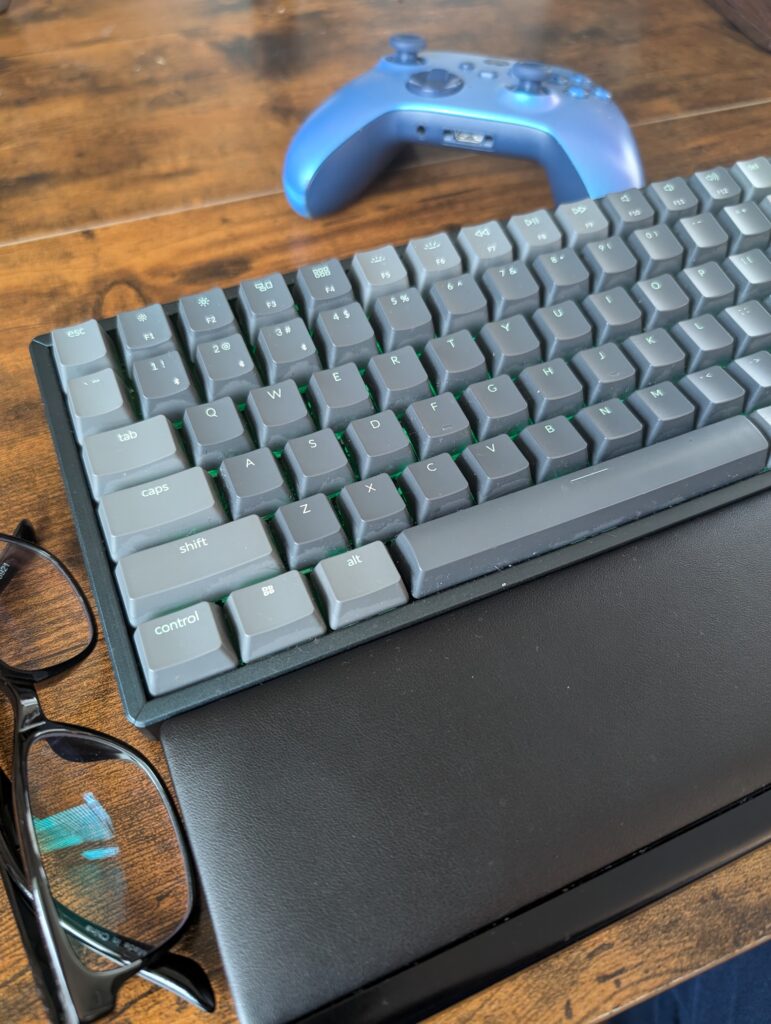
You work hard to develop video games. Now let’s take care of the legal challenges so you can make it a business.
I’m a game developer too, so I know what goes into creating a game. More than that, I’m a game developer lawyer. When you’re trying to make a business out of it, it’s more than just creating your game. There are a lot of business and legal considerations that you have to take care of, ideally before you get started.
I want to help you tackle your legal and business issues so you can get back to creating what you love. It could be making sure that your contracts are in order so you can work with the intellectual property in the game you’re creating, making sure that your business is set up properly, protecting your game’s and studio’s name, or anything else.

Independent Contractor/Work for Hire Agreement
An independent contractor agreement is necessary when you’re working on a game development project and you’re working with other people. It makes sure that the underlying intellectual property that is created (such as visual art, code, or sound) is owned by the right parties and that the terms of payment and other details are agreed upon by both parties before work gets started.
Why is an independent contractor agreement so important?
A properly drafted independent contractor or work for hire agreement lets you get around the default state of copyright, that whoever makes a work owns the copyright in it. This is generally great, but not ideal when people are working together on a video game that you intend to sell. You can read more about Works Made for Hire here.
Collaboration Agreement
Sometimes game development starts and you’re not thinking about the long-term legal situations. You need a collaboration agreement so that everyone knows what the terms of the agreement are and that the agreement is legally sound.
Game jams are a fantastic example of this. With so little time on the clock, who has time to worry about making sure there’s a contract in place? What happens when you want to expand your game jam game into a full game? Other times you’re looking to work with someone else or a small team and you want to make sure that that one of you doesn’t get screwed later and that you all own the game together.
At the end of the day, you’re making a commercial product that can be sold for money, so you need a contract to make sure that all the details are sorted out and that you both have rights in the work. Let’s get a contract drafted so that everyone is on the same page so you can get back to developing your game.
I trust my friend or other collaborator! Why should I get a contract?
Once money starts coming in or other rights get involved, problems can start coming up very quickly, even when people start with the best intentions.
A contract doesn’t mean that you don’t trust one another, it both makes sure that everyone is on the same page as far as the details are concerned and it makes that deal legally enforceable. It’s better to hash out the small details early.
It protects all parties involved, and makes sure everyone understands one another and nothing is miscommunicated.
Who owns the IP when multiple people work together on a game?
The only responsible answer here is that it depends!
In the absence of any sort of written agreement, your game could be a joint work or a collective work, which isn’t ideal if you’re planning on selling it. Read more about that here.
Company Formation
If you’re serious about starting your studio, you’ll want to actually be a studio in the eyes of the law. It’s not enough to call yourself a studio, Let’s get you set up properly so you can pursue your game development dreams.
Note that I am only licensed in the state of Oregon, so if you’re looking to form a company in another state we’ll have to talk about getting someone from that state.
Why should I form a formal company as a game developer?
Forming a legal entity like a Limited Liability Corporation (LLC) allows you to create a legal separation between you and your company so that you’re not personally liable for everything. It also creates more legitimacy in the eyes of your customers, and allows you to have your studio’s name appear as the developer of your game on Steam once a few additional steps are completed.
Contract Review
Got a contract from someone else? Not sure what to do next or what you should be worried about? Whether it’s an independent contractor agreement, licensing agreement, publishing agreement, or any other sort of contract in this industry, you should make sure you get it reviewed by a lawyer so you can deal with confidence.
Almost nothing in a contract is set in stone, it’s usually an ongoing negotiation. We’ll have a conversation about your goals, then I’ll review the contract and highlight key areas or potential problems as well as explain in plain language the parts that you’re having trouble understanding. Then you’ll be empowered to either request changes as needed or sign without worrying.
What’s the difference between a publisher and a developer?
A lot of times these two are the same company, but when an independent game developer is working with a publisher we’ll usually use these terms to distinguish the two.
A developer would be the one who makes the game, but usually lacks either money to finish the game or market it.
A publisher solves those problems by bringing money, but often also marketing experience, contacts, and resources to reach more people than the developer otherwise would. They’ll usually fund a game’s development and help market it in exchange for a cut of the game’s revenue.
I’m talking to a publisher, and they want to own the game’s intellectual property. What should I do?
The specifics here will vary based on your situation, so let’s talk. However, your intellectual property is important to you and your studio, and the publisher owning the IP isn’t ideal, or normal. According to one source, 93% of publishing contracts the developer owned the underlying intellectual property.
I hear a lot about tricks and traps that publishers are putting into publishing agreements with developers. Is the publisher I’m talking with just evil?
Despite what people say online, probably not! A lot of times these provisions are either in the contract to protect the publisher and their interests or are put into their agreements as a starting point for all of their agreements that may or may not actually reflect the specifics of the deal you’re working out with them. They’re probably not evil or trying to scam you, they just have their own interests to protect, and are also trying to make money like any other business.
Remember- nothing in a contract is truly so standard that it is unchangable. A contract sent for review is just one step in ongoing negotiations to finalize details.
What sorts of things should I watch out for in a publishing agreement?
There are a lot of things to be aware of, but one that I like to highlight is ways that you own your intellectual property, but in name only, you can’t do anything with it. Read more about these pitfalls here. Beyond those highlighted here, there are other provisions that I would look for or be wary of depending on your goals and needs, so let’s talk.
How much do you charge to review a contract?
Since contracts can vary in length and complexity, this is one service that I tend to offer at an hourly rate, but we can work it out to match your budget, or I can offer a flat fee once I see the size and complexity of the contract.
Terms of Use/End User License Agreement
Terms of Use (ToS) and End User License Agreements (EULA) are important documents for a game to have, especially those with an online component. It allows you to lay out the terms of engagement that your players have with your game. I can help you draft one, let’s talk.
What’s the difference between a TOS and EULA?
Both of these documents are important for a game developer to have, I wrote more about them in this post.
Privacy Policy
A Privacy Policy is required by law in many jurisdictions. It’s a necessary document if your game is collecting data about your players. Even if you think your game isn’t, there’s a good chance that you’re using a third-party service that is. It’s an evolving and potentially complex web of laws that vary by jurisdiction, so let’s make sure you’ve got it done properly.
What sorts of privacy laws should I aware of?
There are a lot! The FTC has some rules, as well as the CCPA and CPRA in California as well as rules like the GDPR in the EU and others. Read more about them here.
Intellectual Property Assignment
An assignment lets you fully transfer ownership of a piece of art, a brand, or other Intellectual Property. It’s an agreement that fully transfers the ownership, unlike a license which only grants permission to use it. Sometimes you need to get IP assigned to you, or you’re selling your IP to someone else like a publisher. Whatever the case, make sure you do it in a way that doesn’t put your rights at risk, and that you understand what you’re buying or selling.
Why should I assign my IP to my company instead of owning it personally?
It depends on your specific needs and goals, but generally speaking having all of the intellectual property in your game in one big bucket that is your company makes certain things easier. It means you can expand your company and even leave it or sell it to someone else so they can continue when the time comes to pursue other projects. It also creates a cleaner separation between yourself and your company’s assets, which is a good idea to maintain in general.
Licensing Agreement
When you’re working with any intellectual property in your game, there are two ways to do so. One is to own it. The other is to get a license. A licensing agreement allows you to either license a work from someone else or to license out your own work so you can make money from their use. This is pretty common for soundtracks and sound effects, and it allows someone to use these assets without having to fully own or create them. We’ll work together to customize and tailor a licensing agreement based on your needs and the exact terms of your deal so you can make sure that you’re protected and able to use a work that someone else made or let others use yours without worry.
What’s the difference between licensing my work to someone and assigning it?
Assigning your intellectual property to a company or another person means that you are effectively transferring ownership of that work to the other person. It’s as if they created it.
Licensing means you still own the IP, but you are giving them permission to use the thing you created under the terms that are laid out in the agreement, which usually takes the form of a contract between the parties.
If I’m a game developer, is it better that I have a license to the work created for my game or that it is assigned to me and my studio?
It depends on your specific goals, needs, the work, and budget. In general, my preference would be to have it assigned to you (or to have it be a work made for hire) because that ensures that you can use the work for any re-release in the future. There are a number of examples of games not being able to use certain songs or other assets because the license expired.
There are certain types of works where a license is more common and nearly as good. These are for works where they could be reused in other games as a standalone creation and it wouldn’t be a problem for either creator, or has already been published as a standalone work outside of the game. Usually these are sound effects or even music. It also tends to be cheaper.
Can I be sued for using someone else’s work?
Infringement is when someone uses something protected by intellectual property laws (copyright, trademark, or patent) that someone else owns the right to without permission. It’s not impossible that the original rights holder will find out, so the worst thing that could happen to your game that’s using someone else’s art, music, characters, or other protected work would be for you to find success and suddenly get the attention of the rights holder.
We both want you to be successful without worries, so let’s go ahead and take care of these things by properly owning or licensing everything in your game.
US Federal Trademark Registration
Your brand is important. It’s easily your biggest asset as a developer. It’s your reputation, your product, and your name all in one. It helps people know who you are so that when they like one of your games they’ll check out your next ones. Make sure that you’re protected legally as you use your name in commerce.
Trademark registration with the United States Patent and Trademark Office (the USPTO) ensures that nobody else can infringe on your brand’s name and that you’re protected if they do. I’ll do a trademark search and give you advice on selecting a strong, protectable mark. I’ll then walk you through the trademark registration process and get your mark registered. After your mark is registered, I can even monitor the USPTO’s registrations and alert you if there are any marks being registered that you should be worried about.
Why do I need a trademark?
A trademark is an identifier of source. That is, if I get a good or service from a brand, I know that I can expect a similar level of quality from that brand every time. In that way, a trademark is a formal protection of your studio’s name. If someone sees a game from that studio, they know it’s from you and not someone else. They know that if they liked your last game, they’ll probably like this one.
A registered trademark lets the world know that you have claimed that name and are using it in business. It’s often the first step in protecting your mark, since you can legally claim to have registered protection over it.
Should I get a trademark for my studio’s name, or for my game’s name?
Yes! Both are good! Your game is part of your brand too, especially if you will be in commerce with other aspects of your game like merch.
If you could only prioritize one, I would generally say it’s better to register the trademark for the game’s name first, and then the studio name later. Studio names are a lot easier to rebrand than a game’s name, especially once it has already been released.
That said, your specific situation will vary and you shouldn’t take this as legal advice for your specific situation, so let’s talk and figure out what’s right for you.
What if you do a trademark search and you find a conflicting brand? Do I have to pay you to search again?
I don’t want you to feel pressured to stick with your original mark even if it wouldn’t be the best option just because you’d have to pay more money. If we determine that a different name is more likely to get registration, I’ll do a second search on that one at no additional cost, just so you don’t feel like you’re stuck.
How much are filing fees for a trademark with the USPTO?
Filing fees start at $350 per class of goods or services. There may also be additional fees when filing on an intent to use basis, or when using a different form called the TEAS Standard, which usually isn’t necessary. The USPTO lists their fees here. There are also maintenance fees every couple of years for a few hundred dollars. It all adds up to not be too much in the end.
This also doesn’t include my fees, which are separate. That fee covers a search as well as advice on selecting a strong trademark, and I do offer trademark monitoring as a monthly service to stay on top of important filings like renewals and to alert you of any potentially conflicting marks that are being registered.
US Federal Copyright Registration
When you create a piece of art, you own the rights to it. That could be an individual visual asset like a piece of art, a model, or pixel art, audio like music or sound effects, or even an entire game. While you do own the copyright automatically when you create your game, your protection is somewhat limited until you register your work with the copyright office. I can help you decide whether and when registration is right for you and get you through the registration process so your work is protected.

Let’s talk!
Let’s set up a free consultation and chat. I love meeting creative people and their businesses and helping them succeed.
Consultations are done remotely via video call. We’ll talk about your and your business’s needs and decide on what services you’ll need, if any. This often means that we’ll come up with a plan that includes services that aren’t listed here, so don’t hesitate to reach out.
There’s no fee for this consultation and you’ll be informed before I do any work where fees are assessed.
